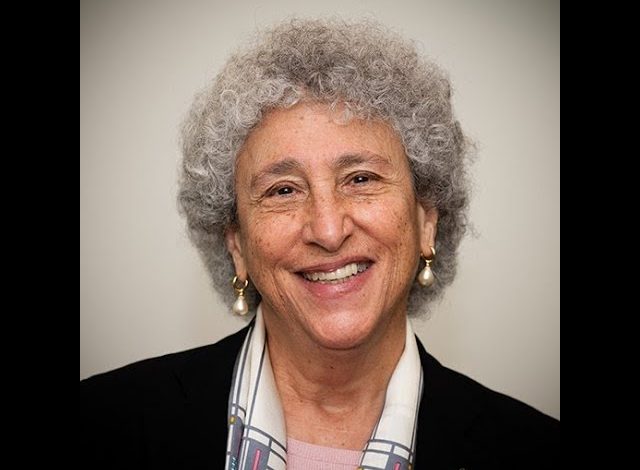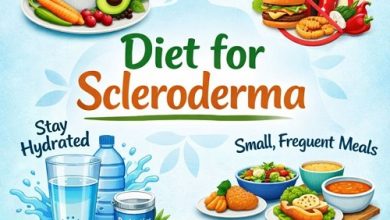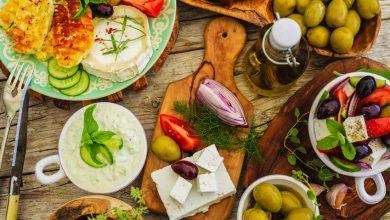How This 89-Year-Old Nutrition Expert Eats to Stay Fit, Sharp, and Radiant

At 89 years old, most people are slowing down—retiring from busy routines, relying on medications, and struggling to maintain energy. But Dr. Eleanor James, a world-renowned nutritionist and longevity researcher, is an inspiring exception. Her sharp memory, glowing skin, and infectious energy make it hard to believe she’s nearly nine decades old.
For over sixty years, Dr. James has studied how food impacts aging, brain health, and vitality. And what’s most fascinating is that she practices what she preaches—her daily meals are living proof that eating right can keep you fit, sharp, and radiant well into your 80s and beyond.
Let’s explore exactly how this 89-year-old nutrition expert eats, the science behind her habits, and the lessons anyone—no matter their age—can learn from her timeless approach to nourishment.
The Foundation: Real, Unprocessed Foods
Dr. James starts every conversation about nutrition with one golden rule:
“If your great-grandmother wouldn’t recognize it as food, it’s probably not helping you age well.”
Her diet centers around whole, minimally processed ingredients—vegetables, fruits, legumes, nuts, seeds, whole grains, and clean protein sources.
She avoids anything with long ingredient lists, added sugars, or artificial preservatives. Instead of relying on convenience foods, she cooks most of her meals from scratch using fresh produce from her local farmer’s market.
Her Daily Philosophy
- No ultra-processed snacks (like chips, cookies, or packaged pastries)
- No sugary drinks or diet sodas
- Plenty of plant-based meals, rich in color and fiber
- Olive oil as her main fat source
- Fermented foods daily, like yogurt, kefir, or kimchi
According to Dr. James, real food equals real energy. She believes that highly processed diets contribute to inflammation, fatigue, and faster aging. Scientific studies back her up—research published in Cell Metabolism has shown that ultra-processed foods can accelerate aging markers and increase the risk of chronic disease.
“Food should come from the earth, not a factory,” she says. “That’s the simplest anti-aging rule I know.”
Her Morning Routine: The Power of a Purposeful Breakfast
Despite her advanced age, Dr. James rises at 6 a.m. every day without an alarm clock. Her morning ritual begins with hydration—a large glass of warm water with a squeeze of lemon and a pinch of sea salt to replenish electrolytes after sleep.
Then comes movement: light stretching, a few yoga poses, and a short walk in her garden to get fresh air and sunlight.
But her favorite part of the morning is her breakfast ritual—simple, balanced, and nutrient-dense.
Dr. James’s Typical Breakfast
- A bowl of oatmeal cooked in almond milk
- Toppings: chia seeds, blueberries, walnuts, and a drizzle of honey
- A cup of green tea or black coffee
- Occasional protein addition: a boiled egg or Greek yogurt
This combination fuels her body with fiber, antioxidants, and protein, which keep her full and mentally alert. She avoids sugary cereals and pastries that spike blood sugar, preferring complex carbohydrates that release energy slowly.
“Breakfast should wake your brain, not drain it,” she says.
Research aligns with her approach. Studies show that diets high in antioxidants—like those found in berries and nuts—protect against cognitive decline, while omega-3 fats from walnuts support brain health.
The Mediterranean Influence
If you peek into Dr. James’s kitchen, you’d think you’re somewhere along the coast of Italy or Greece. Her pantry is stocked with extra-virgin olive oil, lentils, herbs, and whole grains—the core of the Mediterranean diet, widely considered the healthiest way to eat.
This eating pattern emphasizes:
- Fresh vegetables and fruits (especially leafy greens and tomatoes)
- Legumes and beans for plant-based protein
- Fish and seafood several times a week
- Olive oil as the main source of healthy fat
- Moderate wine consumption, although Dr. James prefers grape juice
She credits this Mediterranean style of eating for keeping her heart strong and her skin glowing.
“People think aging means losing your beauty,” she says, smiling. “But if you nourish your skin from the inside—with olive oil, hydration, and antioxidants—it stays radiant.”
Scientific evidence supports her claim. A landmark study published in The New England Journal of Medicine found that the Mediterranean diet reduces the risk of heart disease, dementia, and overall mortality. It’s rich in anti-inflammatory compounds that combat oxidative stress—the main driver of visible aging.
Her Secret Weapon: Plant Diversity
One of the most surprising aspects of Dr. James’s diet is how it is. She aims to eat at least 30 different plant foods each week—a variety of fruits, vegetables, nuts, seeds, grains, and herbs.
This habit stems from research showing that gut microbiome diversity is a key predictor of longevity and health. A diverse diet feeds beneficial gut bacteria, which in turn support digestion, immunity, and even mood.
Her Plant Variety Strategy
- Each week, she buys a mix of seasonal produce
- She adds fresh herbs like parsley, basil, and dill to nearly every meal
- She sprinkles flaxseeds or hemp seeds on salads and soups
- She rotates her grains—quinoa, barley, farro, and brown rice
“Your gut bacteria are like a garden,” she explains. “The more variety you feed them, the more they thrive—and so do you.”
Lunch: Balanced, Colorful, and Light
Unlike many people who eat heavy midday meals, Dr. James prefers light but balanced lunches that don’t weigh her down.
Her typical lunch plate might include:
- A large salad with spinach, chickpeas, avocado, tomatoes, and grilled salmon
- A drizzle of olive oil and balsamic vinegar
- A side of whole-grain toast or quinoa
- Herbal tea or infused water with mint and cucumber
She eats slowly, savoring each bite. Mindful eating, she says, helps digestion and prevents overeating.
Why It Works
This kind of lunch offers a perfect blend of macronutrients—protein for muscle maintenance, healthy fats for brain function, and fiber for satiety. The antioxidants from vegetables protect cells from damage, supporting long-term vitality.
Dr. James also avoids multitasking while eating—no phone, no television. She treats meals as moments of gratitude and calm.
“How you eat is just as important as what you eat,” she insists.
The Afternoon Ritual: Brain-Boosting Snacks
Instead of reaching for processed snacks, Dr. James relies on small portions of brain-boosting foods to sustain her focus and energy during the day.
Her Favorite Snacks
- A handful of almonds or walnuts
- A square of dark chocolate (at least 70% cocoa)
- Green tea or matcha for gentle caffeine and antioxidants
- Apple slices with almond butter
These snacks keep her blood sugar steady and support mental clarity. She avoids sugar-heavy treats that lead to energy crashes.
“I’d rather have 100 calories of something nourishing than 300 of something that makes me tired,” she laughs.
Dark chocolate, in particular, is one of her “joy foods.” Rich in flavonoids, it enhances blood flow to the brain and protects against cognitive decline—a sweet indulgence with scientific backing.
Dinner: Simple, Nourishing, and Early
Dr. James eats dinner early—around 6:00 p.m.—to give her body plenty of time to digest before bed.
A typical dinner might be:
- Grilled trout or tofu
- Steamed vegetables like broccoli, carrots, and zucchini
- A small portion of brown rice or lentils
- A glass of warm herbal tea afterward
She often finishes her meal with a small serving of fruit—usually berries or kiwi for their vitamin C and fiber.
“Eating early helps me sleep better and wake up feeling refreshed,” she explains.
Indeed, studies suggest that earlier dinners align better with the body’s natural circadian rhythm, improving metabolism and sleep quality.
Hydration and Herbal Support
Dr. James believes hydration is the unsung hero of aging gracefully. She drinks at least eight glasses of water daily, often infused with lemon, cucumber, or mint.
She also swears by herbal teas—not just for comfort, but for their health benefits.
Her Go-To Teas
- Green tea for antioxidants
- Chamomile for calmness and digestion
- Ginger tea for anti-inflammatory support
- Hibiscus tea for heart health
She avoids sugary beverages entirely, calling them “empty calories that steal your vitality.”
Her hydration habits not only keep her skin radiant but also support kidney function and circulation—both critical for longevity.
Supplements—But Only What’s Needed
Despite her background in nutrition, Dr. James isn’t overly reliant on supplements. She believes most nutrients should come from whole foods. However, she does take a few essentials that she calls her “nutritional insurance.”
Her Supplement List
- Vitamin D3 (for bone health and immunity)
- Omega-3 fish oil (for brain and heart health)
- Magnesium (for relaxation and muscle support)
- Probiotic capsule (for gut balance)
“Supplements should fill small gaps—not replace real food,” she cautions.
This balanced view has kept her metabolism steady and her energy levels youthful, even as she nears 90.
Her Mindful Relationship with Food
Beyond the nutrients, Dr. James’s success comes from her mindset toward eating. She doesn’t view food as restrictive or moralized—there’s no guilt, no obsession, no fad diets.
Instead, she treats eating as an act of self-respect and gratitude. She blesses her food before eating, eats slowly, and stops when satisfied.
“The joy you bring to the table nourishes you as much as the meal itself,” she says.
She enjoys occasional treats—homemade desserts or a glass of red grape juice—because balance, not deprivation, is the key to sustainability.
Movement and Lifestyle Synergy
Dr. James’s health doesn’t rely on diet alone. She moves daily—light yoga, gardening, and evening walks. She practices mindfulness, reads constantly, and keeps a vibrant social life.
Her philosophy is holistic:
“Eat clean, move often, think positively, sleep deeply, and stay curious. That’s the real anti-aging formula.”
Lessons We Can All Learn
Dr. James’s diet may sound simple, but its principles are deeply powerful. Here’s what anyone can take from her approach:
- Eat real food—not processed products.
- Start the day with purpose—hydrate, move, and eat a balanced breakfast.
- Prioritize plants—the more colorful your plate, the better.
- Choose healthy fats like olive oil, nuts, and seeds.
- Eat mindfully and stop before full.
- Stay hydrated with water and herbal teas.
- Supplement wisely—only if truly necessary.
- Enjoy food—because pleasure supports well-being.
The Bottom Line
At 89, Dr. Eleanor James stands as living proof that how you eat profoundly shapes how you age. Her daily meals—rooted in simplicity, diversity, and mindfulness—show that vitality isn’t about fad diets or miracle pills. It’s about consistency, nourishment, and joy.
Her glowing skin, sharp mind, and infectious enthusiasm are not luck—they are the rewards of decades of treating food as medicine.
“You can’t control how many years you live,” she often says, “but you can control how vibrant those years feel.”
So, take a page from her book: fill your plate with plants, savor your meals, and nourish not just your body—but your life.




